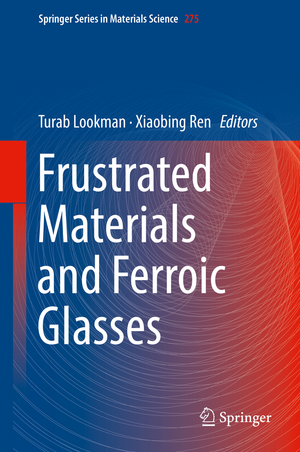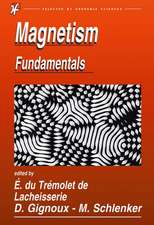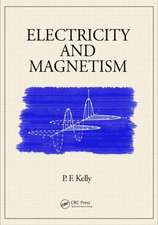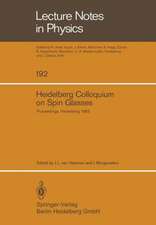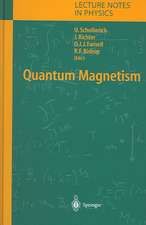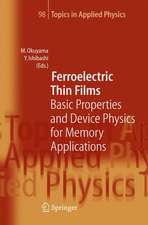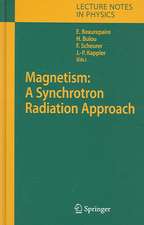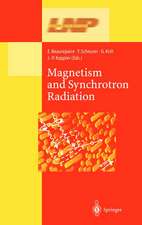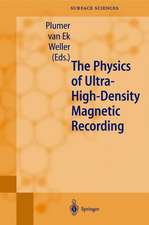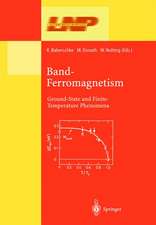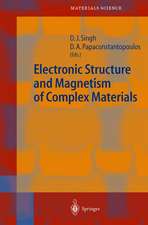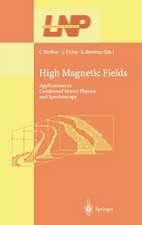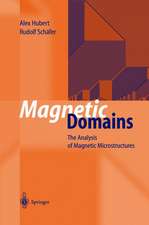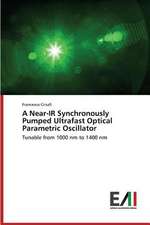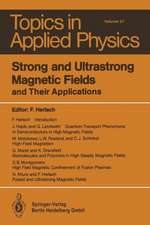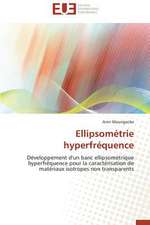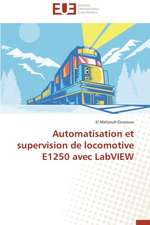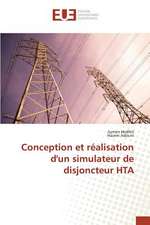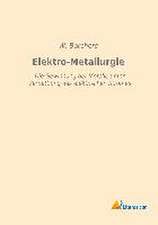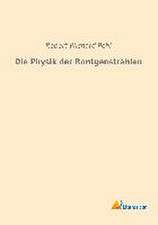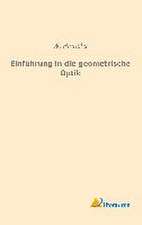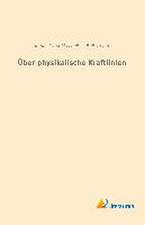Frustrated Materials and Ferroic Glasses: Springer Series in Materials Science, cartea 275
Editat de Turab Lookman, Xiaobing Renen Limba Engleză Hardback – 12 noi 2018
The purpose of this work is to collect in a single volume the range of materials systems with differing functionalities that show many of the common characteristics of geometrical frustration, where interacting degrees of freedom do not fit in a lattice or medium, and glassy behavior is accompanied by additional presence of disorder. The chapters are written by experts in their fields and span experiment and theory, as well as simulations. Frustrated Materials and Ferroic Glasses will be of interest to a wide range of readers in condensed matter physics and materials science.
| Toate formatele și edițiile | Preț | Express |
|---|---|---|
| Paperback (1) | 583.78 lei 6-8 săpt. | |
| Springer International Publishing – 3 ian 2019 | 583.78 lei 6-8 săpt. | |
| Hardback (1) | 732.52 lei 6-8 săpt. | |
| Springer International Publishing – 12 noi 2018 | 732.52 lei 6-8 săpt. |
Din seria Springer Series in Materials Science
- 18%
 Preț: 1820.22 lei
Preț: 1820.22 lei - 18%
 Preț: 776.09 lei
Preț: 776.09 lei - 24%
 Preț: 689.69 lei
Preț: 689.69 lei - 18%
 Preț: 968.96 lei
Preț: 968.96 lei - 20%
 Preț: 568.95 lei
Preț: 568.95 lei - 18%
 Preț: 953.65 lei
Preț: 953.65 lei - 18%
 Preț: 902.36 lei
Preț: 902.36 lei - 18%
 Preț: 953.65 lei
Preț: 953.65 lei - 20%
 Preț: 948.42 lei
Preț: 948.42 lei - 18%
 Preț: 1143.07 lei
Preț: 1143.07 lei - 18%
 Preț: 1111.53 lei
Preț: 1111.53 lei - 18%
 Preț: 1103.62 lei
Preț: 1103.62 lei - 18%
 Preț: 1225.94 lei
Preț: 1225.94 lei -
 Preț: 473.91 lei
Preț: 473.91 lei - 18%
 Preț: 782.42 lei
Preț: 782.42 lei -
 Preț: 433.47 lei
Preț: 433.47 lei - 18%
 Preț: 1116.40 lei
Preț: 1116.40 lei - 18%
 Preț: 946.24 lei
Preț: 946.24 lei - 18%
 Preț: 945.20 lei
Preț: 945.20 lei - 18%
 Preț: 1114.21 lei
Preț: 1114.21 lei - 15%
 Preț: 641.20 lei
Preț: 641.20 lei - 18%
 Preț: 958.56 lei
Preț: 958.56 lei - 18%
 Preț: 1224.36 lei
Preț: 1224.36 lei - 15%
 Preț: 644.82 lei
Preț: 644.82 lei - 24%
 Preț: 833.45 lei
Preț: 833.45 lei - 24%
 Preț: 1060.36 lei
Preț: 1060.36 lei - 18%
 Preț: 964.10 lei
Preț: 964.10 lei - 18%
 Preț: 1224.36 lei
Preț: 1224.36 lei - 18%
 Preț: 1221.20 lei
Preț: 1221.20 lei - 18%
 Preț: 946.87 lei
Preț: 946.87 lei - 18%
 Preț: 1836.92 lei
Preț: 1836.92 lei - 15%
 Preț: 643.34 lei
Preț: 643.34 lei - 18%
 Preț: 1246.32 lei
Preț: 1246.32 lei - 18%
 Preț: 956.81 lei
Preț: 956.81 lei - 18%
 Preț: 953.52 lei
Preț: 953.52 lei - 15%
 Preț: 637.59 lei
Preț: 637.59 lei
Preț: 732.52 lei
Preț vechi: 893.32 lei
-18% Nou
Puncte Express: 1099
Preț estimativ în valută:
140.21€ • 152.35$ • 117.85£
140.21€ • 152.35$ • 117.85£
Carte tipărită la comandă
Livrare economică 21 aprilie-05 mai
Preluare comenzi: 021 569.72.76
Specificații
ISBN-13: 9783319969138
ISBN-10: 3319969137
Pagini: 260
Ilustrații: XIII, 276 p. 153 illus., 133 illus. in color.
Dimensiuni: 155 x 235 mm
Greutate: 0.59 kg
Ediția:1st ed. 2018
Editura: Springer International Publishing
Colecția Springer
Seria Springer Series in Materials Science
Locul publicării:Cham, Switzerland
ISBN-10: 3319969137
Pagini: 260
Ilustrații: XIII, 276 p. 153 illus., 133 illus. in color.
Dimensiuni: 155 x 235 mm
Greutate: 0.59 kg
Ediția:1st ed. 2018
Editura: Springer International Publishing
Colecția Springer
Seria Springer Series in Materials Science
Locul publicării:Cham, Switzerland
Cuprins
List of Contributors.- Preface.- 1 What can spin glass theory and analogies tell us about ferroic glasses?.- 2 Spin glasses: Experimental signatures and salient outcomes.- 3 Frustration(s) and the Ice Rule: From Natural Materials to the Deliberate Design of Exotic Behaviors.- 4 Glassy phenomena and precursors in the lattice dynamics.- 5 Relaxor Ferroelectrics.- 6 Probing glassiness in Heuslers via density functional theory calculations.- 7 Strain glasses.- 8 Discrete pseudo spin and continuum models for strain glass.- 9 Mesoscopic modelling of strain glass.- 10 Phase field simulations of ferroic glasses.
Textul de pe ultima copertă
This book provides a comprehensive introduction to ferroics and frustrated materials. Ferroics comprise a range of materials classes with functionalities such as magnetism, polarization, and orbital degrees of freedom and strain. Frustration, due to geometrical constraints, and disorder, due to chemical and/or structural inhomogeneities, can lead to glassy behavior, which has either been directly observed or inferred in a range of materials classes from model systems such as artificial spin ice, shape memory alloys, and ferroelectrics to electronically functional materials such as manganites. Interesting and unusual properties are found to be associated with these glasses and have potential for novel applications. Just as in prototypical spin glass and structural glasses, the elements of frustration and disorder lead to non-ergodocity, history dependence, frequency dependent relaxation behavior, and the presence of inhomogeneous nano clusters or domains. In addition, there are newstates of matter, such as spin ice; however, it is still an open question as to whether these systems belong to the same family or universality class.
The purpose of this work is to collect in a single volume the range of materials systems with differing functionalities that show many of the common characteristics of geometrical frustration, where interacting degrees of freedom do not fit in a lattice or medium, and glassy behavior is accompanied by additional presence of disorder. The chapters are written by experts in their fields and span experiment and theory, as well as simulations. Frustrated Materials and Ferroic Glasses will be of interest to a wide range of readers in condensed matter physics and materials science.
- Brings together experts in glasses, geometrical frustration, and functional materials
- Covers theory, experiment, and simulations of ferroics
- Features an easy-to-read introduction in each chapter to make specialized topics accessible to a broad readership in condensed matter physics and materials science
Caracteristici
Brings together experts in glasses, geometrical frustration, and functional materials Covers theory, experiment, and simulations of ferroics Features an easy-to-read introduction in each chapter to make specialized topics accessible to a broad readership in condensed matter physics and materials science
